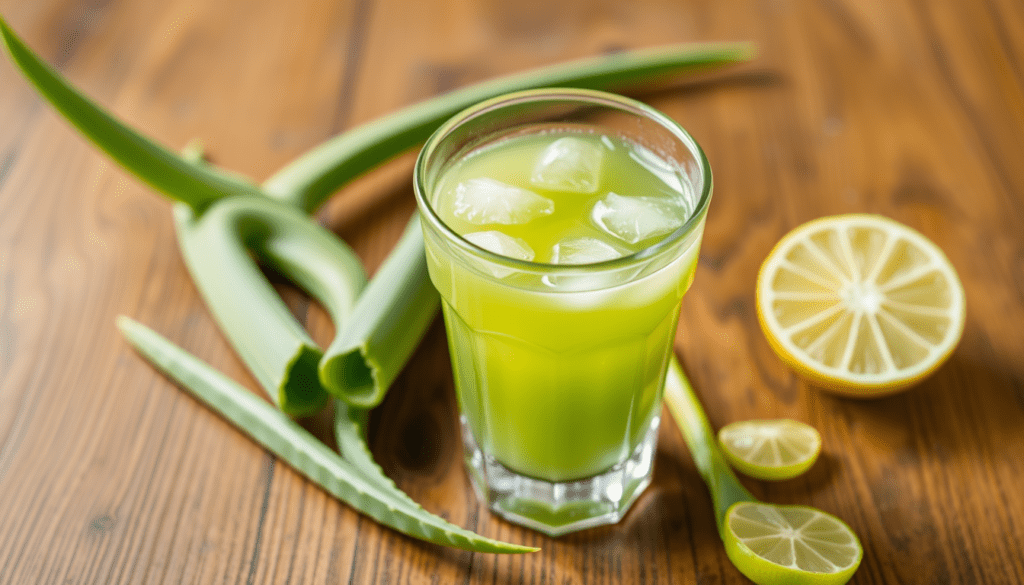🌿 Discover the Perfect Plants for Your Space! 🌿
Explore our handpicked collection of cycads, aloes, seeds, and more to transform your garden or landscape.
Nutritional Profile of Aloe Vera Juice
Aloe vera, the succulent plant known for its soothing gel, also offers a wealth of nutrients in juice form. Aloe vera juice is a surprisingly low-calorie beverage, making it a refreshing and hydrating choice. It’s packed with vitamins, including vitamins A, C, and E, which are potent antioxidants that help protect your body against damage from free radicals. It also contains several B vitamins, crucial for energy production and nerve function. Beyond vitamins, aloe vera juice provides essential minerals like calcium, magnesium, potassium, and zinc, contributing to overall health and well-being.
One of the standout components of aloe vera juice is its rich content of polysaccharides. These complex sugars offer a range of potential health benefits, including supporting healthy digestion and boosting immunity. Some polysaccharides in aloe vera, like acemannan, are believed to have anti-inflammatory and immune-modulating properties. Furthermore, aloe vera juice contains amino acids, the building blocks of protein, which are vital for various bodily functions, including cell growth and repair.
While the nutritional composition can vary slightly depending on the processing method and brand, aloe vera juice generally provides a good source of these beneficial nutrients, making it a valuable addition to a healthy diet. It’s important to note that the taste of pure aloe vera juice can be somewhat bitter, so many commercially available versions include added sweeteners or flavors to improve palatability.
Potential Health Benefits
Aloe vera juice has been touted for a wide array of potential health benefits, many of which stem from its rich nutritional profile and the presence of bioactive compounds like polysaccharides and antioxidants. One of the most well-known potential benefits is its soothing effect on the digestive system. It’s believed that aloe vera juice can help calm the digestive tract, reducing symptoms of indigestion, heartburn, and occasional constipation. For individuals with irritable bowel syndrome (IBS), aloe vera juice might offer some relief from discomfort and promote regularity.
Beyond digestion, aloe vera juice may contribute to enhanced immunity. The polysaccharides in aloe vera, particularly acemannan, are thought to stimulate the immune system, potentially increasing the production of white blood cells that fight off infections. The antioxidant vitamins present in the juice, such as vitamins C and E, also play a role in protecting the body against oxidative stress and supporting immune function. Some studies suggest that aloe vera juice might help improve blood sugar control, which is beneficial for individuals with or at risk of type 2 diabetes. However, more research is needed to confirm these findings and understand the underlying mechanisms.
The hydrating properties of aloe vera juice also contribute to its potential health benefits. Staying adequately hydrated is crucial for overall health, and aloe vera juice can be a refreshing way to increase fluid intake. Some proponents suggest that aloe vera juice can support skin health, potentially reducing inflammation and promoting healing. It’s important to note that while these potential benefits are promising, more scientific research is needed to fully understand the extent of aloe vera juice’s therapeutic effects. As with any dietary supplement, it’s essential to consult with a healthcare professional before incorporating aloe vera juice into your routine, especially if you have any underlying health conditions or are taking medications.
How to Consume Aloe Vera Juice
Integrating aloe vera juice into your routine can be simple and versatile. One popular way is to enjoy it as a standalone beverage. Start with a small amount, perhaps 2-4 ounces, and gradually increase the serving size as your body adjusts. Pure aloe vera juice has a slightly bitter taste, so many people prefer to mix it with other juices or smoothies to enhance the flavor. Combining it with fruit juices like apple, orange, or pineapple can create a refreshing and nutritious drink.
For those seeking a quick and easy boost, many health food stores and online retailers offer ready-to-drink aloe vera juice blends. These often come in various flavors and may contain added ingredients like vitamins, minerals, or herbs. When choosing a pre-made blend, check the label carefully to ensure it contains a substantial amount of pure aloe vera juice and avoid excessive added sugars or artificial ingredients. You can also find aloe vera juice in concentrated form, which can be diluted with water or other beverages according to your preference. This allows you to customize the strength and flavor of your aloe vera drink.
Beyond beverages, aloe vera juice can be incorporated into various recipes. Adding a small amount to smoothies, soups, or sauces can provide a nutritional boost without significantly altering the taste. Some individuals even use aloe vera juice in homemade popsicles or frozen yogurt for a healthy and refreshing treat. Experimenting with different ways to consume aloe vera juice can help you find methods that suit your palate and lifestyle. Remember to start with small quantities and observe how your body reacts. While aloe vera juice offers numerous potential health benefits, including supporting digestion and boosting immunity, it’s important to listen to your body and adjust your intake accordingly.
Side Effects and Precautions
While generally safe for consumption, aloe vera juice can cause side effects in some individuals, particularly when consumed in large quantities or by those with certain sensitivities. Some common side effects include abdominal cramps, diarrhea, and electrolyte imbalances. These effects are often related to the laxative properties of aloe vera. It’s important to start with a small dose and monitor how your body reacts. If you experience any adverse effects, discontinue use and consult a healthcare professional.
Certain individuals should exercise caution or avoid aloe vera juice altogether. Pregnant or breastfeeding women should avoid aloe vera juice due to its potential to stimulate uterine contractions. Individuals with diabetes should also consult their doctor before consuming aloe vera juice, as it may interact with blood sugar-lowering medications. Those with kidney conditions should be cautious as well, as aloe vera can have a diuretic effect. As with any dietary supplement, it’s always best to consult with a healthcare professional before incorporating aloe vera juice into your routine, especially if you have any underlying health conditions or are taking medications.
Selecting and Storing Aloe Vera Juice
When selecting aloe vera juice, look for products made from 100% pure aloe vera inner leaf gel. Check the label for certifications like the International Aloe Science Council (IASC) seal, which indicates that the product has met quality standards. Choose products that are free from added sugars, artificial flavors, and colors. Organically sourced aloe vera juice is also a good option, as it ensures the plant was grown without pesticides or herbicides.
Once opened, aloe vera juice should be refrigerated to maintain its freshness and quality. Properly stored, it can typically last for several weeks. Always check the expiration date and discard any juice that has an off odor, color, or texture. Storing aloe vera juice in a dark, cool place can help preserve its nutrients and prevent spoilage. Following these guidelines can help you select and store aloe vera juice effectively, ensuring you receive its maximum potential health benefits.
Side Effects and Precautions
While generally safe for consumption, aloe vera juice can cause side effects in some individuals, particularly when consumed in large quantities or by those with certain sensitivities. Some common side effects include abdominal cramps, diarrhea, and electrolyte imbalances. These effects are often related to the laxative properties of aloe vera. It’s important to start with a small dose and monitor how your body reacts. If you experience any adverse effects, discontinue use and consult a healthcare professional.
Certain individuals should exercise caution or avoid aloe vera juice altogether. Pregnant or breastfeeding women should avoid aloe vera juice due to its potential to stimulate uterine contractions. Individuals with diabetes should also consult their doctor before consuming aloe vera juice, as it may interact with blood sugar-lowering medications. Those with kidney conditions should be cautious as well, as aloe vera can have a diuretic effect. As with any dietary supplement, it’s always best to consult with a healthcare professional before incorporating aloe vera juice into your routine, especially if you have any underlying health conditions or are taking medications. This is particularly important if you are seeking to utilize aloe vera juice for specific health benefits related to digestion or immunity.
Long-term use of aloe vera juice, especially the whole leaf variety which contains aloin, a potent laxative, can lead to more serious complications. Excessive aloin intake can cause dehydration, mineral deficiencies, particularly potassium depletion, and even potentially damage the colon. Therefore, it is recommended to choose aloe vera juice that is specifically processed to remove aloin. Sticking to the recommended dosage is also crucial to avoid these potential risks. While aloe vera juice offers a wealth of potential benefits, responsible consumption is key to maximizing its positive effects and minimizing the risk of adverse reactions. Always prioritize your health and consult with a healthcare provider if you have any concerns.
Don’t be swayed by fancy packaging or marketing claims alone. Flip the bottle over and scrutinize the ingredients list. Ideally, you want to see minimal additions – pure aloe vera juice should be the star of the show. Avoid products with added sugars, artificial flavors, or colors. These additions not only dilute the nutritional benefits but can also contribute to unwanted health issues. If organic is important to you, look for certifications to ensure the aloe vera was grown without pesticides and herbicides. Think of it as getting the purest form of nature’s goodness.
Once you’ve found your perfect bottle of **aloe vera juice**, proper storage is key to maintaining its freshness and maximizing its potential **health benefits**. Treat it like a delicate elixir! After opening, store it in the refrigerator. This helps preserve its quality and prevents the growth of unwanted bacteria. Aim to consume it within a few weeks for optimal freshness. Also, pay attention to the expiration date – even refrigerated, it doesn’t last forever. Before each use, give the bottle a good shake. Sometimes the beneficial components can settle at the bottom. And finally, a quick sensory check: if the juice develops a strange odor, color, or texture, it’s time to bid farewell. Don’t risk it! By following these simple selection and storage tips, you can ensure you’re getting the most out of your **aloe vera juice** and enjoying its potential benefits for **digestion**, **immunity**, and overall well-being.
🌿 Discover the Perfect Plants for Your Space! 🌿
Explore our handpicked collection of cycads, aloes, seeds, and more to transform your garden or landscape.

